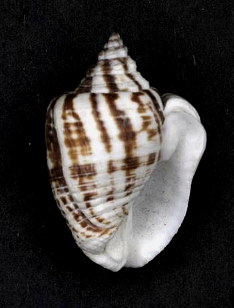Triumphis
| Triumphis | |
|---|---|

| |
| Shell of Triumphis distorta | |
| Scientific classification | |
| Kingdom: | Animalia |
| Phylum: | Mollusca |
| Class: | Gastropoda |
| Subclass: | Caenogastropoda |
| Order: | Neogastropoda |
| Family: | Pisaniidae |
| Genus: | Triumphis Gray, 1857 |
| Type species | |
| Buccinum distortum W. Wood, 1828 | |
| Synonyms | |
| |
Triumphis is a genus of sea snails, marine gastropod mollusks in the family Pisaniidae, with historically controversial affinities. [1]
It is found in the tropical eastern Pacific.[2]
Classification
[edit]Triumphis was historically classified as a member of Buccinidae, but in 1998, Geerat J. Vermeij assigned it to Pseudolividae,[2] However, in 2017, Kantor and colleagues, in their revision of Olivoidea, tentatively assigned Triumphis to Nassariidae,[3] and in 2024, a phylogenetic analysis by Fedosov and colleagues recovered Triumphis as a member of Buccinoidea, the sister taxon to Pisania, the only member of Pisaniidae included in their analysis.[4] As of December 2024, WoRMS recognizes Triumphis as a member of Pisaniidae;[5] it had previously been included in Pseudolividae.[6]
Characteristics
[edit](original description) The shell is ovate, and it is covered with a thick, coarse, velvety periostracum that hides its true color. The spire is conic, and the whorls are convex. The outer whorls are larger and irregularly cover the rest of the shell.
The aperture is ovate. The inner lip is smooth. The siphonal canal is very short and recurved. The denticles number three; the central one is three-toothed; the lateral ones are large, hamate (hook-shaped), and three-toothed, with the outer tooth being the largest. The operculum is ovate and thick, with an apical nucleus. [7]
Species
[edit]Species within the genus Triumphis include:
- Triumphis distorta (Wood, 1828)
- † Triumphis maitenlahuensis S. N. Nielsen & Frassinetti, 2003
- † Triumphis solida (E. T. Nelson, 1870)
- Species brought into synonymy
- Triumphis subrostrata (W. Wood, 1828): synonym of Nicema subrostrata (W. Wood, 1828)
References
[edit]- ^ MolluscaBase eds. (2025). MolluscaBase. Triumphis J. E. Gray, 1857. Accessed through: World Register of Marine Species at: https://www.marinespecies.org/aphia.php?p=taxdetails&id=489176 on 2025-06-24
- ^ a b Vermeij, Geerat J. (1998). "Generic revision of the neogastropod family Pseudolividae". The Nautilus. 111 (2): 53–84.
- ^ Kantor, Yu. I.; Fedosov, A. E.; Puillandre, N.; Bonillo, C.; Bouchet, P. (2017). "Returning to the roots: morphology, molecular phylogeny and classification of the Olivoidea (Gastropoda: Neogastropoda)". Zoological Journal of the Linnean Society. 180 (3): 493–541. doi:10.1093/zoolinnean/zlw003. eISSN 1096-3642. ISSN 0024-4082.
- ^ Fedosov, Alexander E; Zaharias, Paul; Lemarcis, Thomas; Modica, Maria Vittoria; Holford, Mandë; Oliverio, Marco; Kantor, Yuri I; Puillandre, Nicolas (2024-03-08). "Phylogenomics of Neogastropoda: the backbone hidden in the bush". Systematic Biology: –010. doi:10.1093/sysbio/syae010. eISSN 1076-836X. hdl:11573/1707306. ISSN 1063-5157. PMC 11377187.
- ^ "Triumphis Gray, 1857". WoRMS. World Register of Marine Species. 2024-12-01. Retrieved 2024-12-05.
- ^ "Triumphis Gray, 1857". WoRMS. World Register of Marine Species. 2022-08-29. Archived from the original on 2024-02-16.
- ^ Gray, J.E. (1857). Guide to the systematic distribution of Mollusca in the British Museum. Part I. [Gastropoda]. London: British Museum. p. 15. Retrieved 24 June 2025.
 This article incorporates text from this source, which is in the public domain.
This article incorporates text from this source, which is in the public domain.
